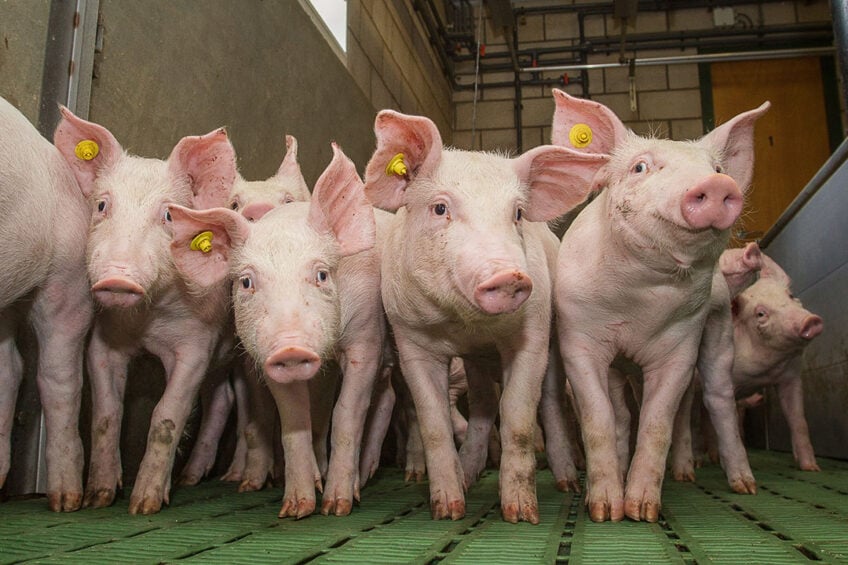November 26, 2025 | 16:20 GMT +7
November 26, 2025 | 16:20 GMT +7
Hotline: 0913.378.918
November 26, 2025 | 16:20 GMT +7
Hotline: 0913.378.918

Photo: Peter Roek
Salmonella is a foodborne pathogen that disrupts the pig’s gut microbiota. It leads to diarrhea, enterocolitis, and dehydration. Healthy gut microbiota decrease the severity of Salmonella infection. Therefore, feed supplements that improve gut microbial populations help control Salmonella infections. Resistant starch is a source of microbiota accessible carbohydrates that increase short-chain fatty acids in the gut, thus improving gut barrier functions. Raw potato starch is a common ingredient of resistant starch that improves fermentation in the digestive tract and increases pro- and anti-inflammatory cytokine levels.
The team randomly divided 12 castrated male pigs (Landrace × Yorkshire) of 28 days of age into the treatment and control groups. The treatment group diet was supplemented with 5% raw potato starch for 21 days. Subsequently, the researchers orally inoculated all pigs with colony forming units of Salmonella Typhimurium. They euthanised them 14 days after bacterial inoculation.
The team collecte fecal and gut tissue samples from jejunum, ileum, colon, and cecum and they incubated these immediately at 42°C for 24 hours. They fixed and stained tissue samples for histopathological evaluation and cytokine quantification. Then, they extracted DNA, and performed bioinformatics analysis was. In addition, they evaluated the concentrations of short-chain fatty acids including acetate, butyrate, and propionate in all experimental pig fecal samples to investigate the effect of altered bacterial communities in both groups.
Although a Salmonella infections reduces body weight and average daily gain, pigs fed with the raw potato starch supplemented diet had a higher average daily gain and a lower Salmonella shedding during the Salmonella infection period. These findings show the gut health-promoting effect in pigs that received a raw potato starch supplemented diet.
Although the researchers observed histopathological lesions in both groups, pigs fed with raw potato starch exhibited less severe organismal damage in the jejunum, ileum, cecum, and colon.They also had a lower isolation rate of Salmonella from the gut tissue. In addition, feeding raw potato starch improved gut health by maintaining the balance of beneficial bacteria, and by increasing the abundance of butyrate-producing and acetate-producing bacteria. This prevented the colonisation of pathogenic bacteria by decreasing gut mucosal permeability.
High acetate and low butyrate/propionate concentrations could cause a more invasive Salmonella infection. In addition, the relative mRNA expression levels of genes related to gut barrier function including CLDN-1 in the cecum and MUC2 in the colon were significantly lower in the pigs fed with raw potato starch, suggesting lower gut permeability.
The relative mRNA expression of the proinflammatory cytokine IL-18, which is necessary to initiate mucosal inflammation was significantly lower in the jejunum and colon of the pigs fed with raw potato starch supplemented diet suggesting reduced Salmonella colonisation. On the other hand, among the genes related to the gut barrier, the expression of the antimicrobial peptide gene Reg3γ was significantly higher in the cecum but lower in the colon of the pigs fed with raw potato starch supplemented diet. The Reg3γ restricts bacterial colonisation of the gut mucosal surface and maintains spatial segregation between bacteria and gut epithelium.
However, the anti-inflammatory cytokine IL-10, and the proinflammatory cytokine IL-17A were expressed less in the jejunum, cecum, and colon of pigs fed with raw potato starch supplemented diet, because Reg3γ overexpression induced high immunosuppression and dramatic reduction in cytokine genes.
The authors concluded that feeding weaned pigs with raw potato starch could improve gut health and reduce Salmonella infections.
(PP)

(VAN) A new study reveals how the simultaneous effects of ocean acidification, salinity and loss of oxygen are making the world more fragile.

(VAN) Hopes are growing that the creation of the first 3D turkey gut model could be a turning point in the battle against the virulent blackhead disease.

(VAN) Tyson, America’s biggest meat supplier, plans to shutter one of its largest beef processing plants as the industry continues to struggle with low cattle supplies and political pressure from Washington.

(VAN) New FAO study shows how digital solutions are empowering farmers and fishers to prevent losses and build resilient agrifood systems.

(VAN) Brazil's COP30 presidency pushed through a compromise climate deal on Saturday that would boost finance for poor nations coping with global warming but that omitted any mention of the fossil fuels driving it.

(VAN) Poultry farmers in the UK have been warned that they could face one of the worst winters yet for bird flu.

(VAN) Prices of main-crop paddy have risen sharply, with jasmine rice hitting 16,100 baht per tonne — the highest level in years.